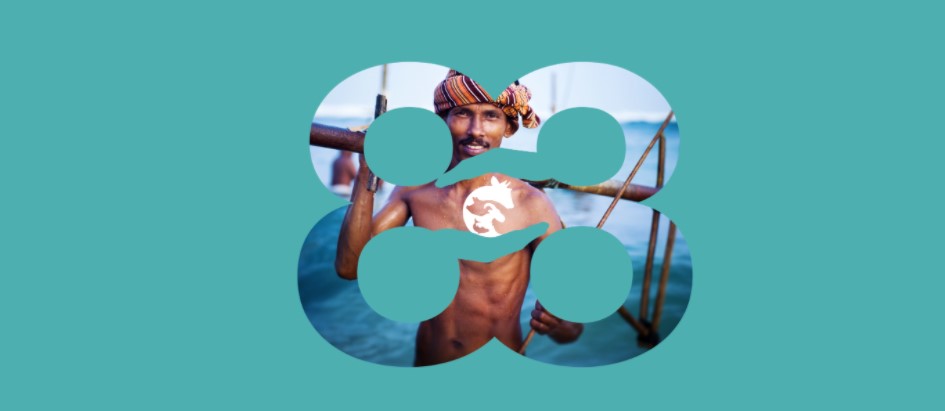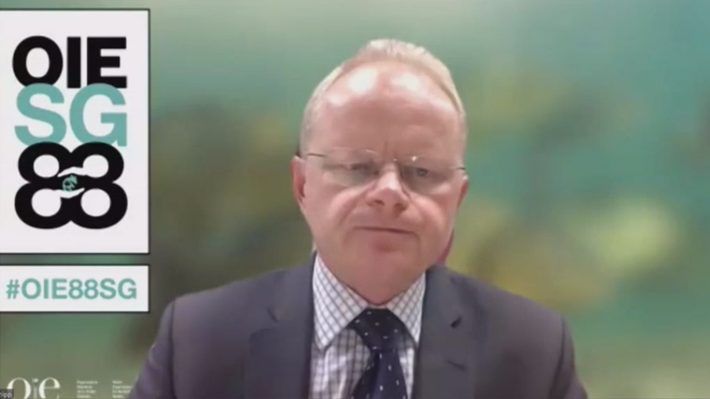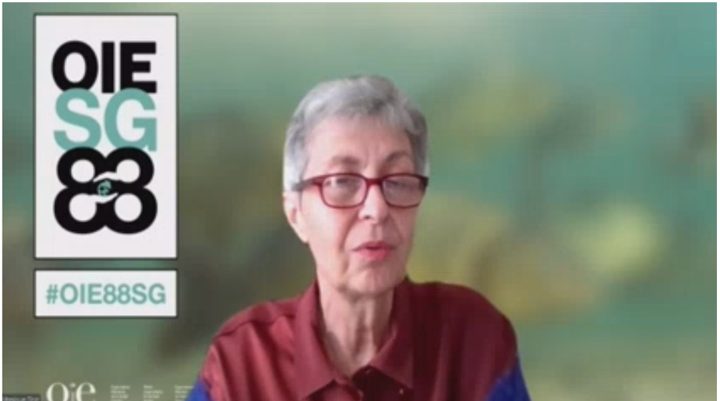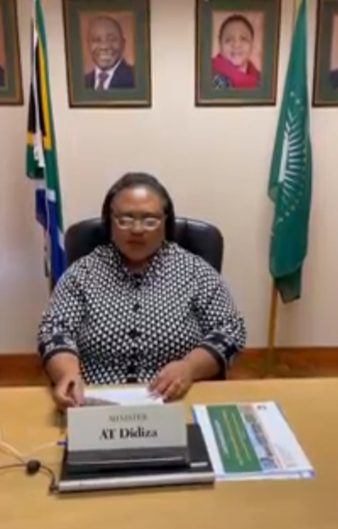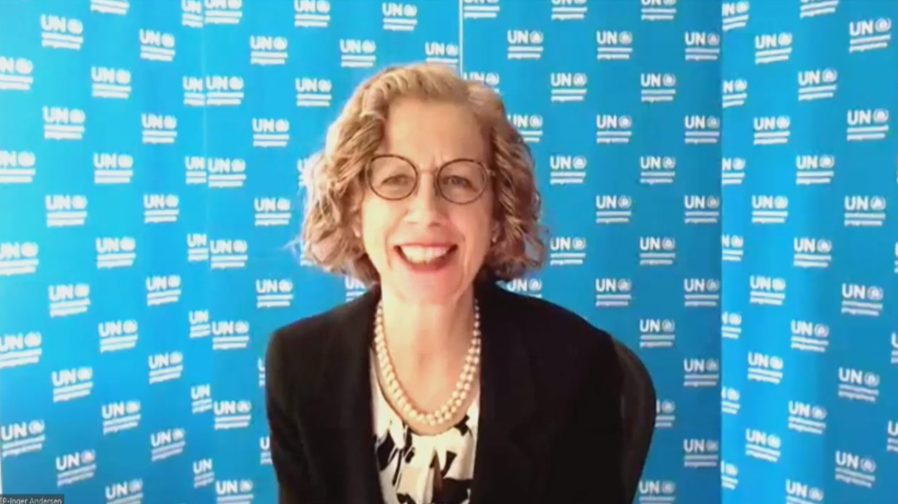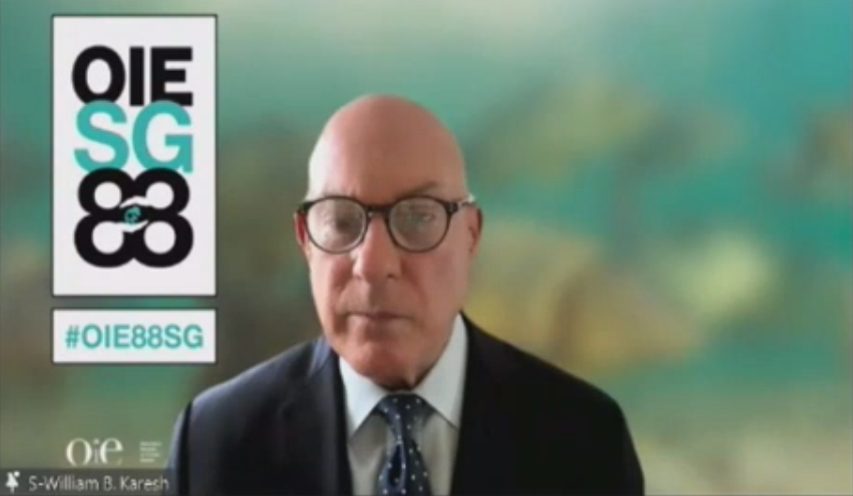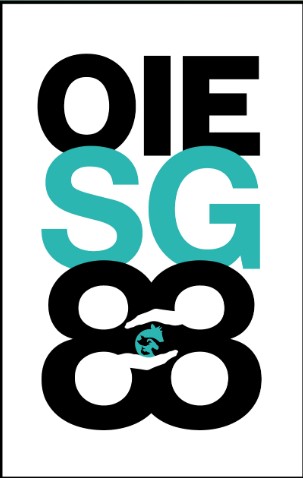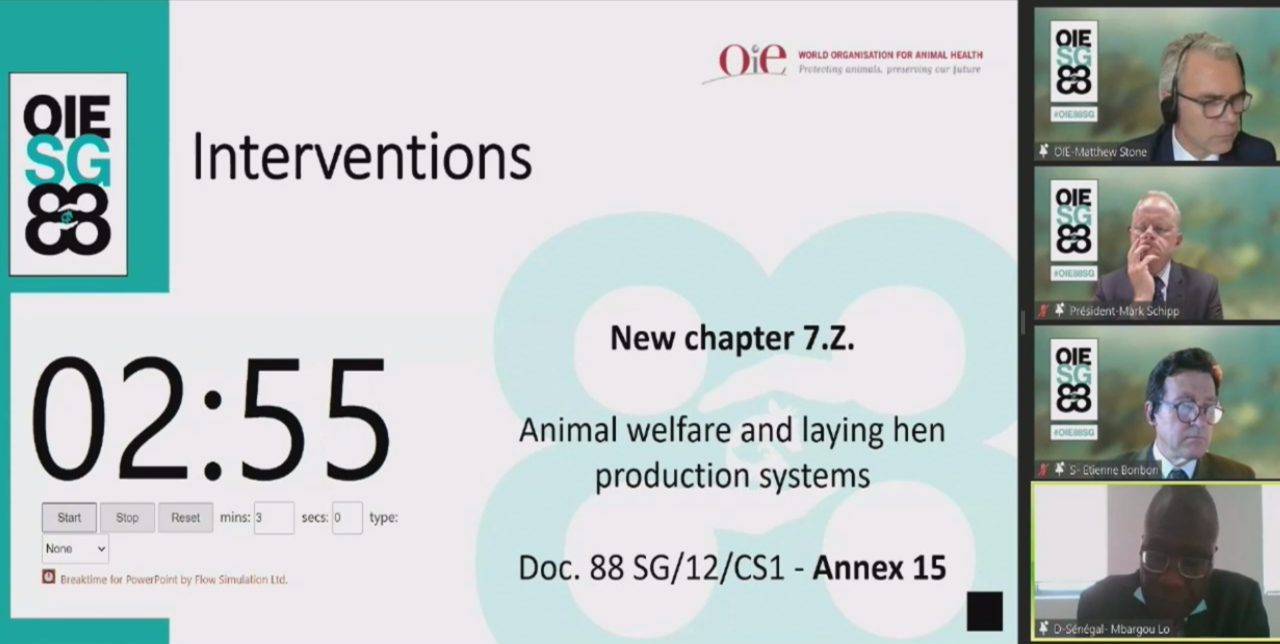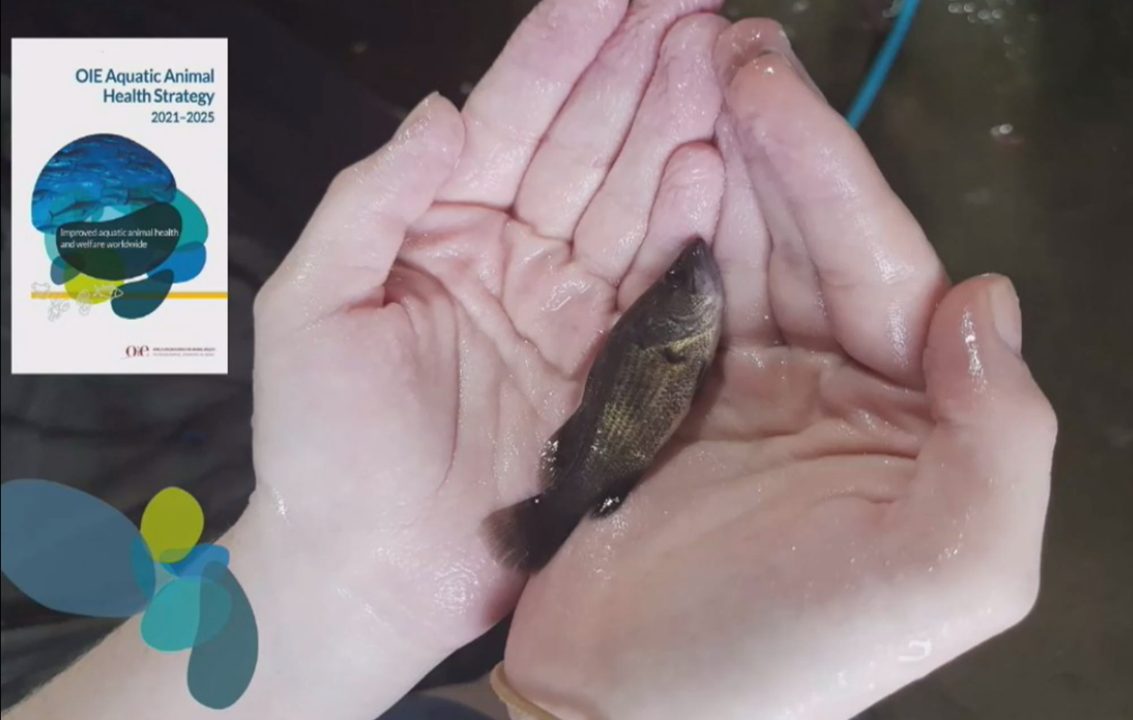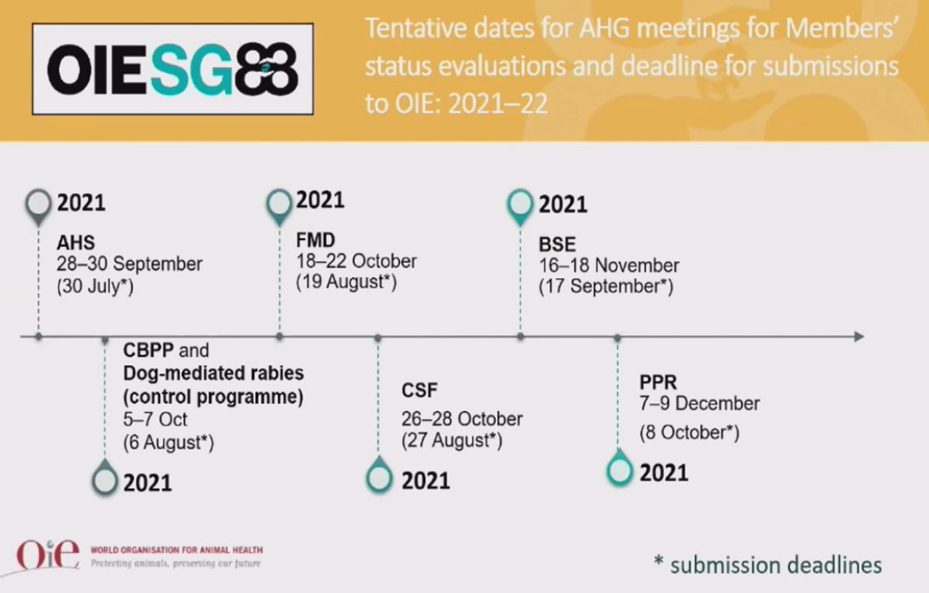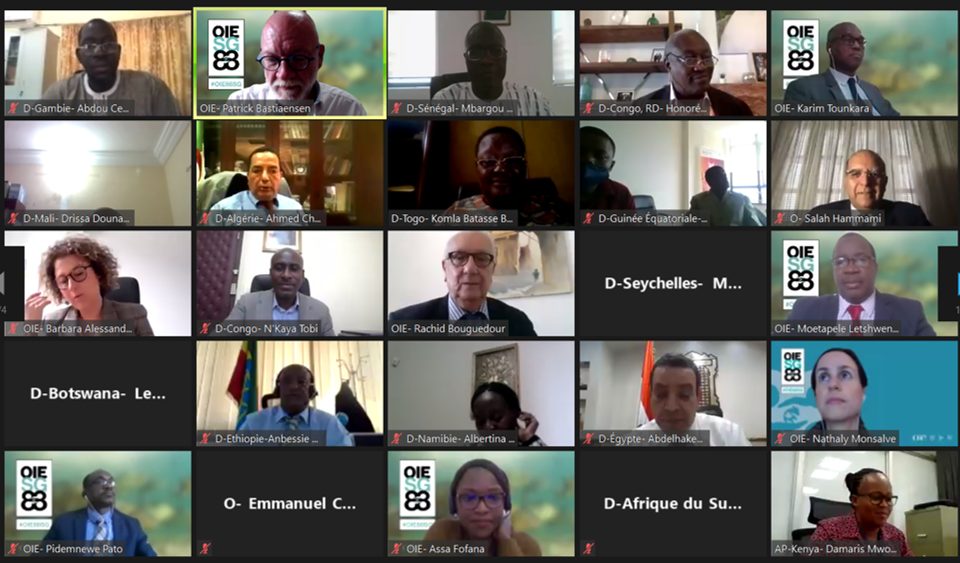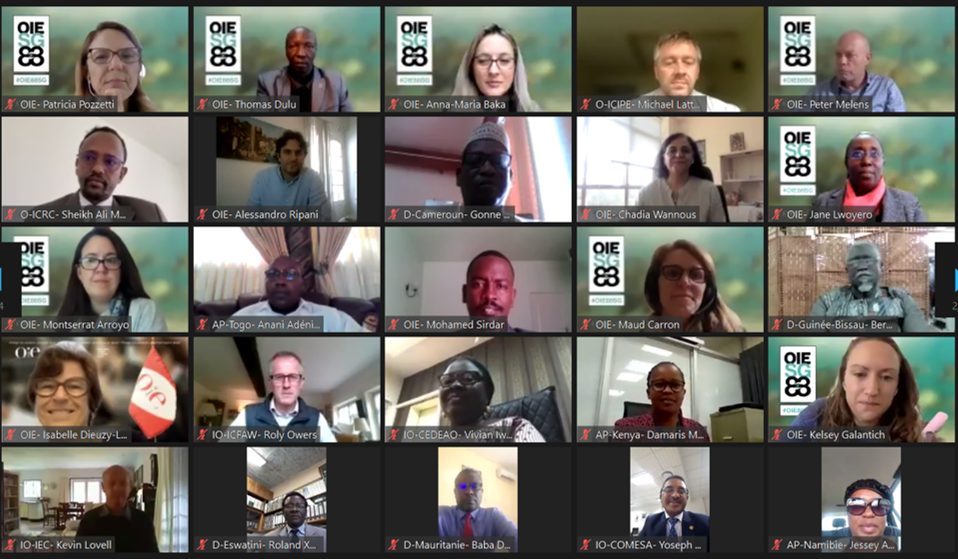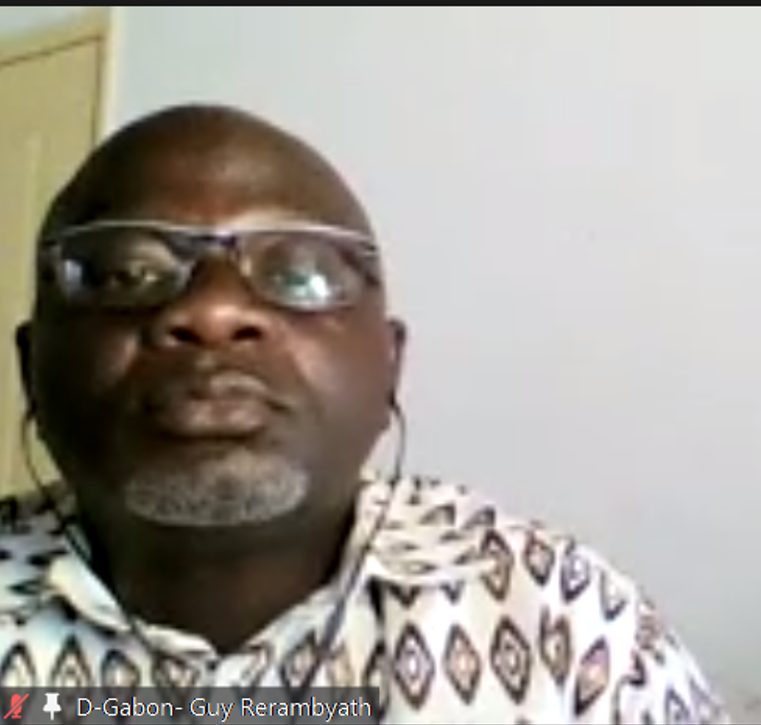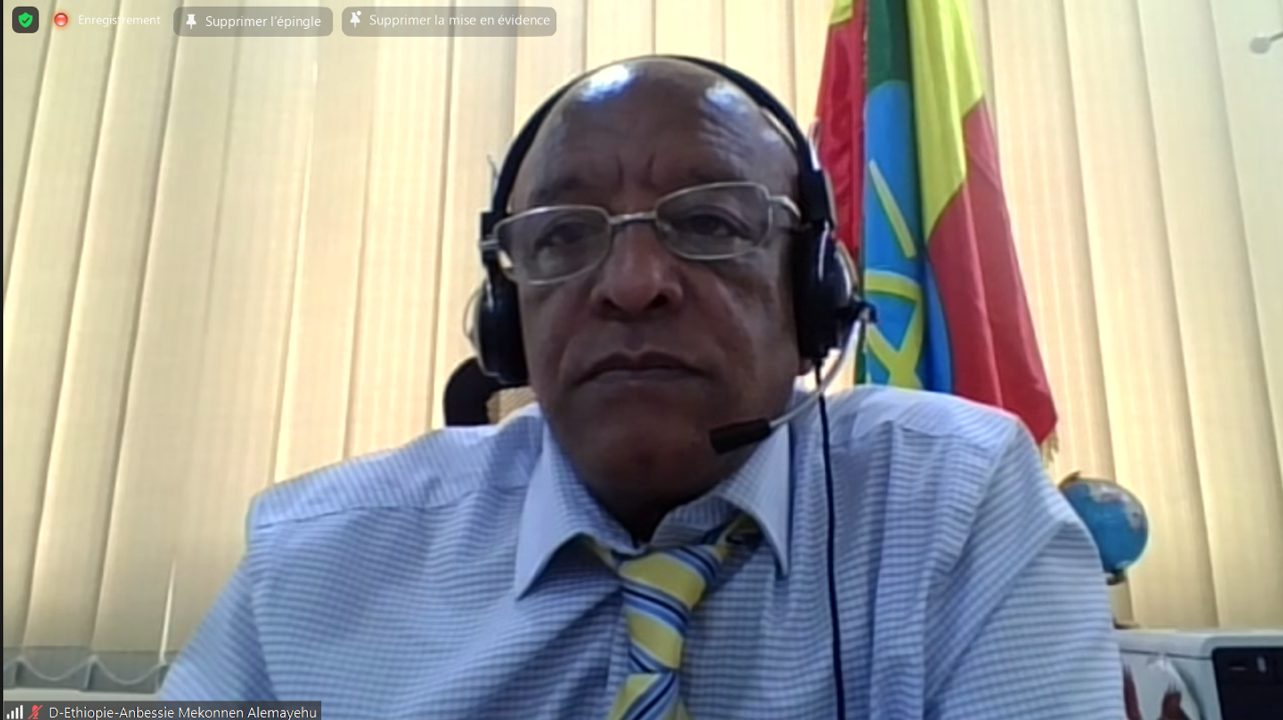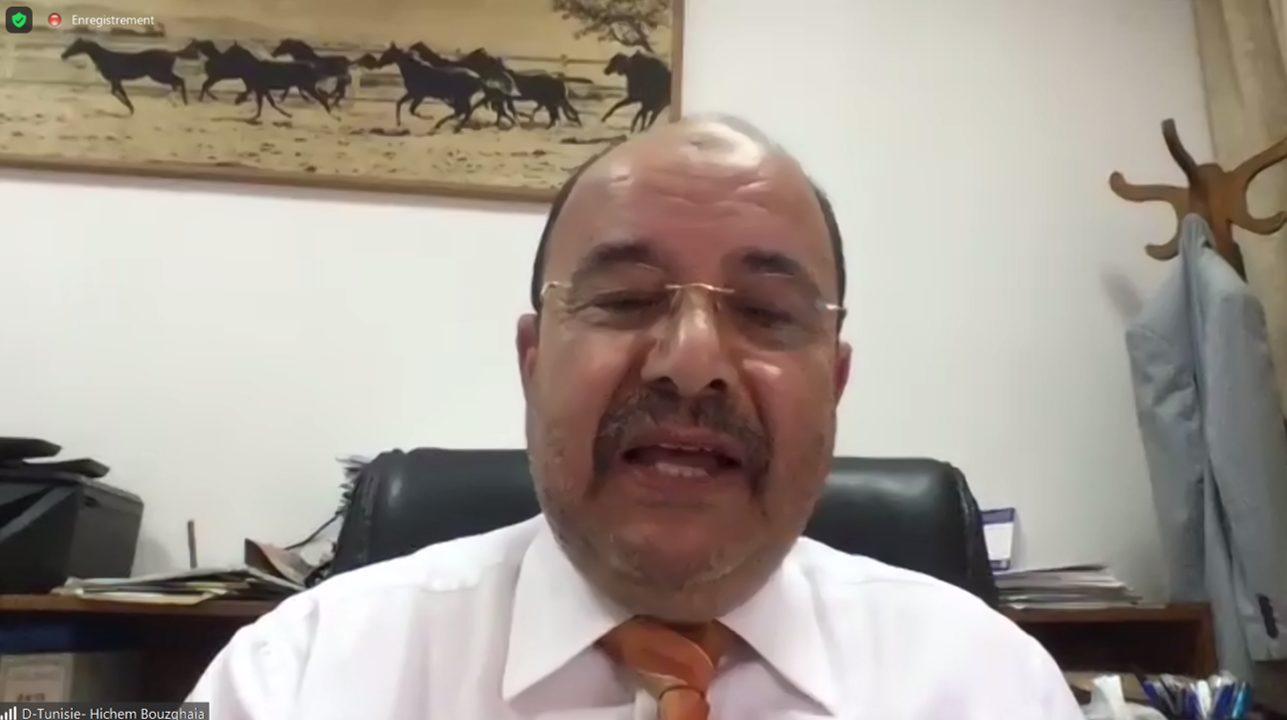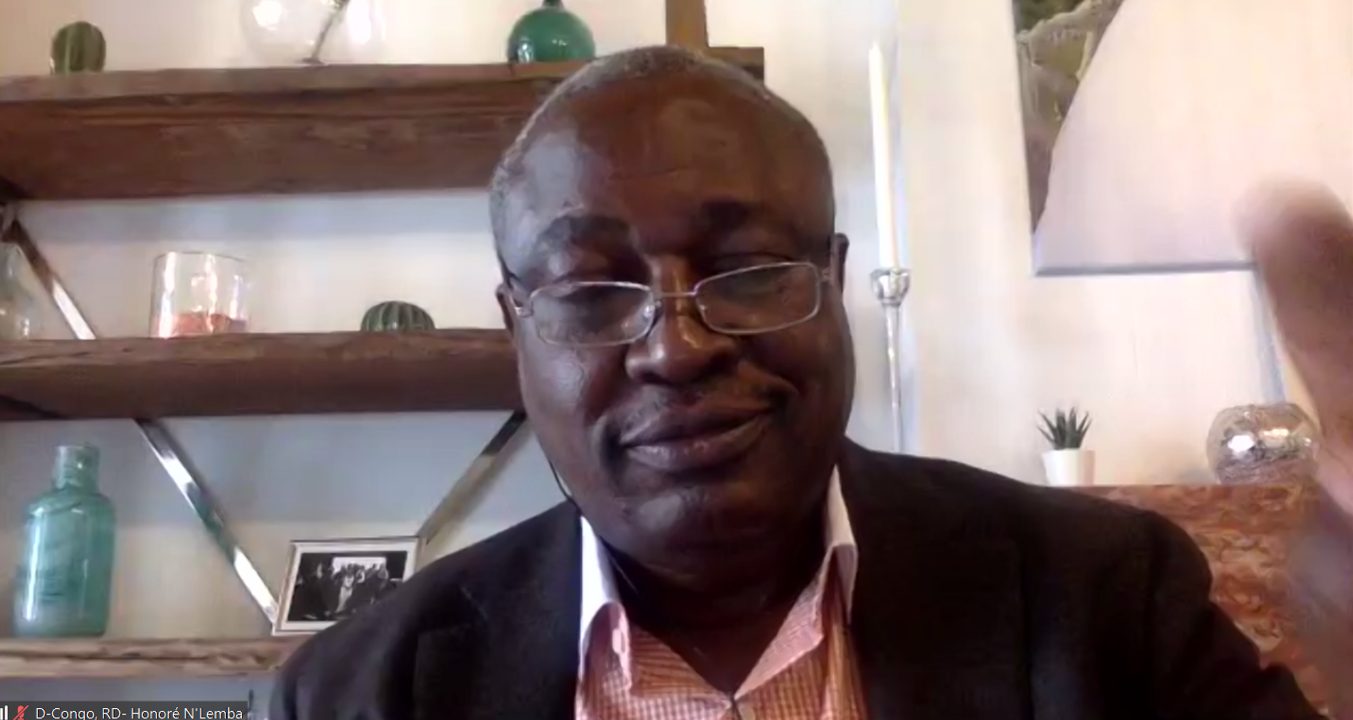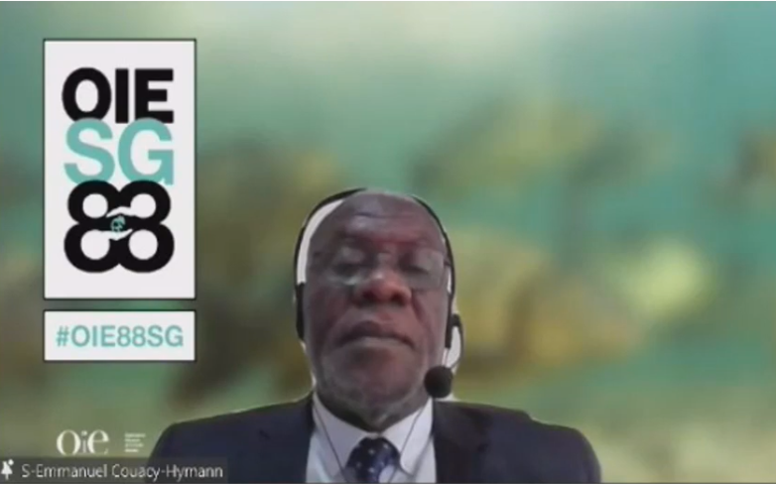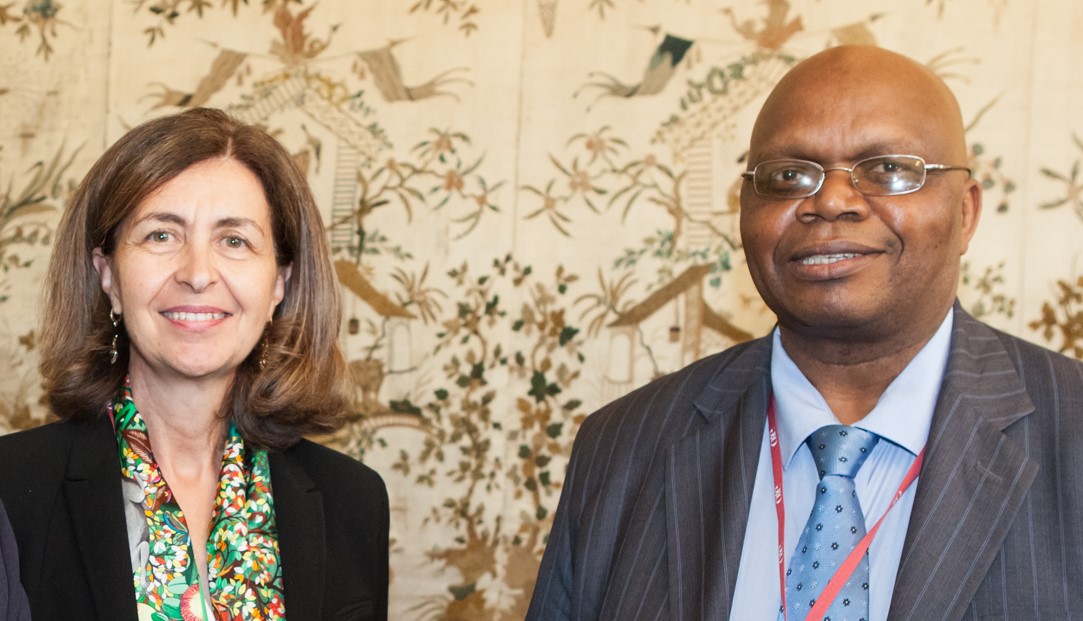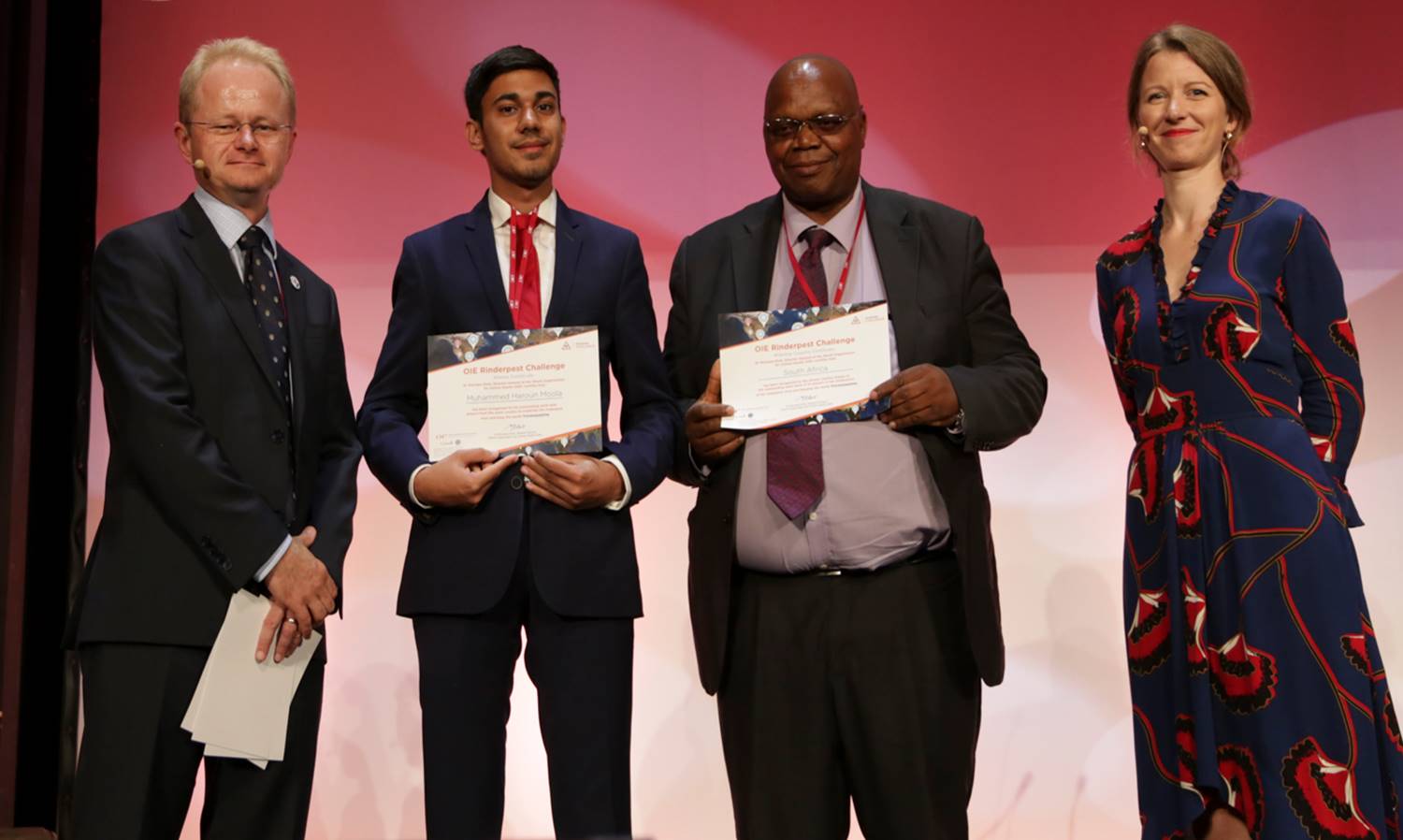
Dr. Mark Schipp, OIE President and OIE Delegate of Australia.
Well over 800 participants following the proceedings through webcast, and 300 attendants on Zoom, representing national Delegates from up to 142 out of 182 Member Countries of the OIE as well as OIE experts, selected staff and representatives of international, intergovernmental, regional and national organisations participated in the first-ever online event. The virtual opening ceremony was held in the (online) presence of 6 Ministers and members of government of OIE Member Countries and Territories, as well as the President of the OIE, Dr Mark Schipp (Australia), and the Director General of the OIE, Dr Monique Eloit.
This 88th General Session (there was no 88th General Session in 2020) not only endorsed important new standards and accredited new institutions, it also elected or re-elected the Director General, the President and Members of the Council, the Regional Commissions and the four Specialist Commissions of the OIE. After a first five-year terms of office, and a one-year extension due to the inability to organise elections in May 2020, in the midst of the COVID-19 crisis, Dr Monique Eloit (France) was re-elected to the position of Director General, for the remaining years of the 2021 – 2025 term, aligned with the 7th Strategic Plan, approved at the same occasion.
Dr. Monique Eloit, OIE Director General, during her opening address.
H.E. Angela Thokozile Didiza, Minister of Agriculture, Land Reform and Rural Development of the Republic of South Africa, during her pre-recorded opening address.
Dr Hugo Federico Idoyaga Benítez (Paraguay) was elected as President of the Council and of the World Assembly of Delegates for a period of three years. He is currently the Vice-President of the Council. Dr Christianne Bruschke (Netherlands) was elected as new Vice-President of the Council and therefore likely successor to Dr Idoyaga Benitez in three years’ time. Dr Daniel Komla Batawui (Togo) and Dr Roland Xolani Dlamini (Eswatini) were re-elected, respectively elected as African Members of the Council.
Ministerial addresses were delivered by Ministers from Barbados, the United Arab Emirates, Indonesia and France, as well as from Africa :
Following the addition of the United Nations Environmental Programme (UNEP) to the extended Tripartite initiative, now referred to as Tripartite + (FAO, OIE, WHO and UNEP) the World Assembly had the honour of welcoming UNEP Executive Director Mrs Inger Andersen who delivered opening remarks focusing on the aspects of environmental health, as part of the One Health continuum.
Mrs. Inger Andersen, Executive Director of the United Nations Environmental Programme (UNEP) during her opening address.
Presentation of Technical Item on “Lessons identified from before and during the pandemic – how the OIE can support veterinary services to achieve One Health resilience”.
Dr William Karesh presented the broad outline of the paper he prepared for the World Assembly, highlighting essential areas addressed by OIE to ensure One Health resilience such as the integration of wildlife health into animal health and the One Health approach, the sustainability of emergency management systems, as well as the sustainability of diagnostic services, delivered by laboratories. Download the paper here
The OIE Delegates adopted and revised a number of international standards for terrestrial and aquatic animal diseases and, in summary, a total of:
The President of the Terrestrial Code Commission, Dr Etienne Bonbon (France), presented the work programme conducted since the previous General Session (2019) and submitted a number of revised and new standards for approval to the World Assembly of Delegates.
Of high relevance to the African continent was the adoption of a new chapter on what was initially referred to as African animal trypanosomosis (AAT) but for which the title was changed, following broad-based objections, not only from Africa, but also from European, Asian, American and Pacific Members, against the geographical pinpointing of the disease as being “African”, something the OIE Delegate of Senegal, speaking on behalf of the 54 OIE Members of the African continent, referred to as stigmatising and potentially harmful to trade from the African continent, even though only a fraction of African countries are affected by vector-borne trypanosomosis. The title was changed to “Infection with Trypanosoma brucei, T. congolense, T. simiae and T. vivax” and was adopted with 100% approval. It is now arguably the longest title of any chapter in the Terrestrial Code.
Another major piece of revision related to section 3 on Veterinary Services, where all chapters have been revised and will now be preceded by an introduction to what is a Veterinary Service. The flow of sections will henceforth be as follows :
The chapter on avian influenza has undergone considerable revision and simplification, focusing on the risks of highly pathogenic avian influenza viruses, clearly separating the standard from low pathogenic avian influenza viruses of relevance to wildlife and/or public health. It is hoped that this revision will be more trade-facilitating than the previous version, whilst encouraging countries to continue surveillance for low-pathogenic viruses, knowing that trade bans are now more than ever unjustified.
The flow of chapters will henceforth be as follows :
Other important decisions taken by the World Assembly with important implications for African Members relate to the revised definitions of wild, captive and feral animals in the glossary, the redefinition of epidemiological unit as starting from a single animal (i.e. horse with glanders, dog with rabies) in the same glossary, and the renaming of “immediate notification” as “initial notification” (as opposed to “follow up” notifications). The definition of protection zone has been revised to allow for the maintenance of trade, whilst dealing with specific countermeasures (i.e. vaccination) in a containment zone (chapter 4.4.).
The long-awaited chapter on the welfare of laying hens failed to gain clear and sufficient support on the Monday and was referred to electronic voting on Friday, where it again failed to bolster a majority and was withdrawn for further consultative rounds. The main concerns varied depending on the regions, varying from not going far enough to going too far and being too prescriptive. The African OIE Members expressed their support for the draft. Note that – as for broilers – the draft standard as it stands today does not apply to dual purpose and subsistence poultry farming, referred to as backyard farming.
Intervention by Dr. Mbargou Lô, OIE Delegate of Senegal, representing the 54 OIE Members of the African Union, in support of the proposed new standard on the welfare of laying hens.
In terms of the Terrestrial Manual, out of the 38 new or revised chapters, 14 underwent extensive reviews and one is entirely new : 3.X.X. Middle East Respiratory Syndrome – Coronavirus (MERS-CoV).
The other chapters, of high relevance to Africa, are related to :
2.1.2. Biotechnology advances
3.1.3. Bluetongue
3.1.21. Trypanosoma evansi
3.1.23. Vesicular stomatitis
3.2.7. Varroosis of honeybees
3.3.4. Highly pathogenic avian influenza viruses (aligned with the adopted changes in the Code)
3.3.5. Avian mycoplasma
3.3.14. Newcastle disease
3.4.8. Contagious bovine pleuropneumonia
3.7.9. Peste des petits ruminants (vaccine section)
3.8.6. PRRS
3.9.5. Cysticercosis
3.9.6. Listeria monocytogenes
The President of the Aquatic Animal Health Standards Commission, Dr Ingo Ernst (Australia), in his presentation of new and revised standards, started by focusing on the introduction of the term “aquatic animal waste” in the Glossary of the Aquatic Code, to clarify the difference(s) with “aquatic animal products”. A new cross-cutting chapter (4.X.) on Biosecurity for aquaculture establishments was unanimously adopted.
Other major reviews concern the Disinfection of eggs (various chapters, article 13) and several amendments to the species affected by infections by Spring viraemia of carp (10.9.), Viral haemorrhagic septicaemia (10.10.) and Bonamia ostrae (11.3.).
Also of interest is the inclusion of a new (OIE listed) disease (of crustaceans) “Infection with decapod iridescent virus 1 (DIV-1)”, for which text will be developed in the following months, both in the Code and the Manual, as was the case for the adoption of the chapter 2.1.X. in the Aquatic Manual for “Infection with Batrachochytrium. salamandrivorans”, first listed in 2017.
Other Aquatic Manual chapters that were revised concern infection with Gyrodactylus salaris (2.3.3.), and infection with Salmonid alphavirus (2.3.6.) and Bonamia ostrae (2.4.3.).
The OIE Director General, Dr Monique Eloit then officially launched the OIE Global Aquatic Animal Health Strategy which aims to provide guidance to Members on how to improve aquatic animal health (and welfare) worldwide and strengthen the role of Veterinary Services in the management of aquatic biosecurity
Dr Monique Eloit introduced the new Strategic Plan to the World Assembly, announcing a considerable break with the past, not only in terms of themes and strategic priorities, but also in terms of implementation, transparency, levels of interaction (with the regions, with partner organisations), flexibility of implementation and the options for re-orientation of strategies based on lessons learned, the monitoring of progress, sources of such information and an overall broader outreach, well beyond the traditional veterinary community, in keeping with societal demands and planetary changes and challenges. The strategic objectives for 2021 – 2025 are listed in the box on the left.
The Director General also introduced Resolution 10 on the (new) modalities for holding the General Session (in a post-pandemic society), which will allow the Council to mandate changes to the future organisation of the General Sessions, based on the experiences gained in the past 1.5 years.
The OIE World Assembly issued certificates of official disease status recognition to 9 countries (some countries twice, for different diseases). Of noting for Africa is the endorsement by the OIE of the official control programme against rabies of Namibia, a first in Africa.
Planning of the meetings of the ad-hoc groups entrusted with the official disease statuses, as convened by the Scientific Commission for Animal Diseases (SCAD).
Two more Reference Centres (Reference Laboratories) were recognised on the African continent and are shared with the Middle-East region :
Reference Laboratory for Veterinary Quality Control on Poultry Production,
Animal Health Research Institute, Agriculture Research Centre,
Ministry of Agriculture and Land Reclamation,
7 Nadi El-Said Street, P.O. Box 12618, Dokki, Giza,
Cairo, EGYPT
Designated Reference Expert: Dr Abdelsatar Arafa.
Department of Brucellosis Research,
Animal Health Research Institute, Agricultural Research Center,
Ministry of Agriculture and Land Reclamation,
7 Nadi El-Said Street, P.O. Box 12618, Dokki, Giza,
Cairo, EGYPT
Designated Reference Expert: Dr Mahmoud Hamdy.
The OIE Regional Commission for Africa met on 24 May 2020 (Monday) and was attended by up to 101 participants, including OIE Delegates from 39 Members (out of the 54 Member Countries) of the Commission, and representatives from 9 regional and international organisations (the African Union Inter-african Bureau for Animal Resources, the Commonwealth Veterinary Association, the Economic Community of West African States, the International Coalition for Animal Welfare, the International Centre for Insect Physiology and Ecology, the International Committee of the Red Cross, the International Egg Commission, the United Nations Office for Disarmament Affairs and the West African Economic and Monetary Union. The meeting was chaired by Dr Honoré Nlemba Mabela (Democratic Republic of Congo), President of the OIE Regional Commission for Africa, and seconded by Dr Karim Tounkara, OIE Regional Representative for Africa.
Dr Letlhogile Modisa, Vice-President of the OIE Regional Commission for Africa and Delegate of Botswana, reiterated his country’s offer to host the 25th Conference of the OIE Regional Commission for Africa in February 2023.
Dr Guy Anicet Rerambyath, OIE Delegate, Gabon.
Exact dates and venue will be defined in a later stage in coordination with the OIE Director General.
The Regional Commission selected the following technical item (with questionnaire to Members) for inclusion in the agenda of the 25th Conference of the OIE Regional Commission for Africa:
Likewise, the proposal of three strategic topics of global interest to be addressed by the OIE through various means (Scientific Review, Newsletter, scientific paper, technical item or during a specific activity/meeting) were selected through a poll exercise and led to the three following choices :
Above : Dr Alemayehu Mekonnen Anbessie, OIE Delegate, Ethiopia
Left : Dr Hichem Bouzghaia, OIE Delegate, Tunisia
In order to free up time for the discussions surrounding the elections, exceptionally no presentations from the Regional and International Organisations were delivered. Indeed, a closed session was held between Delegates only in order to discuss the proposal of candidates for the election concerning all of the OIE’s governance positions.
Dr. Honoré N’Lemba Mabela, OIE Delegate, Dem. Rep. of the Congo
As a result, the following persons were later that week elected to the Bureau of the Regional Commission for Africa :
Following the implementation in 2017 of a new candidates’ vetting procedure, based on scientific and professional achievements and relevance to the mandates of the OIE, the elections of members of the Specialist Commissions included the following experts from Africa:
Scientific Commission for Animal Diseases
Terrestrial Animal Health Standards Commission
Biological Standards Commission
Aquatic Animals Health Standards Commission
Prof. Emmanuel Couacy-Hymann, President of the OIE Biological Standards Commission.
Africa is again represented on all four Specialist Commissions, with at least one, if not two representatives per Commission, with – again – an African occupying a Chairperson’s position, Dr Emmanuel Couacy Hymann (Biological Standards Commission).
Thank you Dr Botlhe Michael “Mike” Modisane for your leadership as President of the OIE World Assembly of Delegates, President of the OIE Council, Immediate Past OIE President, OIE Delegate of the Republic of South Africa and inspiration to all African OIE Delegates. Picture : archive (pre-COVID-19) with the OIE Director General, Dr Monique Eloit, at the 83rd General Session in Paris, 2015.
